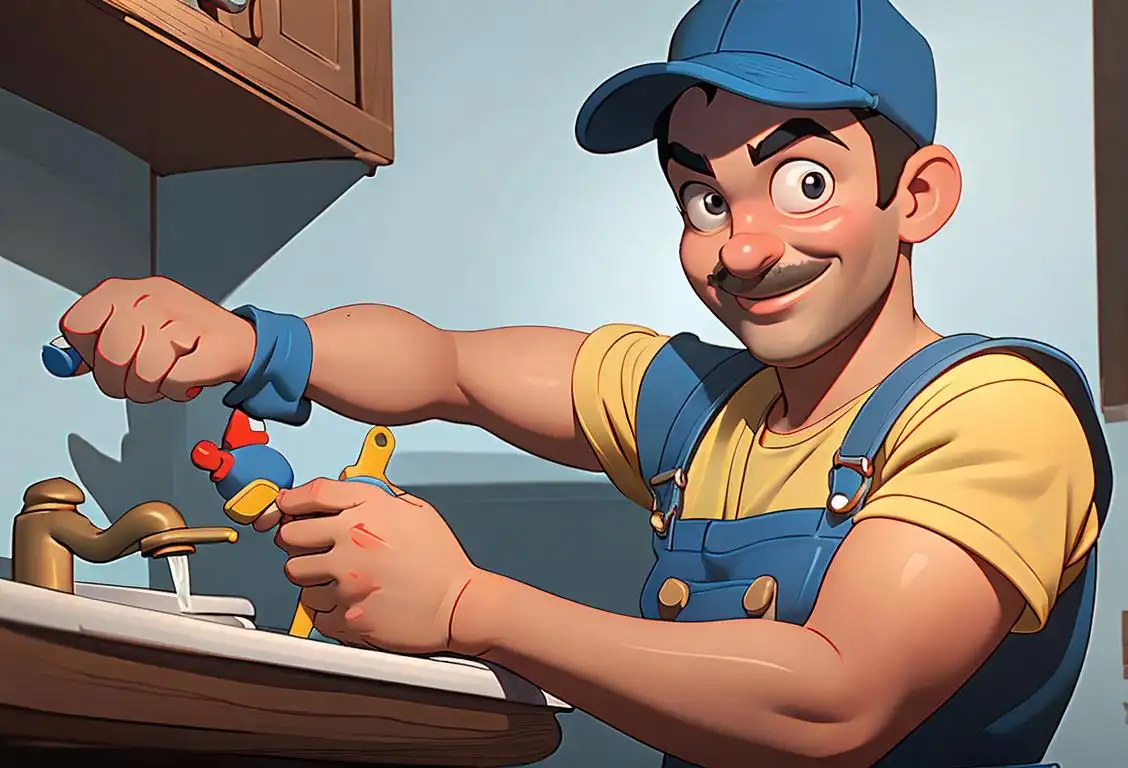National Plumbers Day

Are you tired of leaks, clogs, and wobbly faucets? Well, guess what? We have a day just for you! National Plumbers Day celebrates those unsung heroes who save us from plumbing disasters. So, grab your plungers and let's dive into the history of this watery holiday!
When is Plumbers Day?
It's national plumbers day on the 27th November.
The Birth of National Plumbers Day
Like a superhero emerging from the shadows, National Plumbers Day burst onto the scene on November 27, 2020. This special day was created to honor those brave men and women who dedicate their lives to keeping our pipes flowing and our toilets flushing.
But why November 27th? Maybe it was the perfect timing, just after Thanksgiving when our kitchens are usually overflowing with dirty dishes and greasy pans. Or perhaps it was a nod to the famous historical figure, Thomas Crapper, who made significant contributions to the development of the modern toilet.
The Internet and National Plumbers Day
The internet has played a vital role in spreading the word about National Plumbers Day. Plumbers and plumbing enthusiasts from around the world take to social media platforms to share their stories, insights, and hilarious plumbing mishaps.
Thanks to the online community, websites are buzzing with tips and tricks for fixing common plumbing issues, colorful DIY projects, and even heartwarming stories of plumbers going above and beyond to help others in need.
It's incredible to see how technology has transformed this once underappreciated profession into a celebrated and respected part of our society. So, the next time a plumber comes to your rescue, don't forget to give them a high-tech high-five!
Did You Know?
Plumbers have a long and fascinating history. Did you know that the ancient Romans had a highly sophisticated plumbing system? They even had public baths, heated floors, and flushing toilets! So, next time you're enjoying a luxurious bath or a warm bathroom floor, you can thank the ingenious plumbers of ancient Rome.
History behind the term 'Plumbers'
2500 BC
Early Plumbing Systems
Although the term 'plumber' did not exist at this time, ancient civilizations in Egypt, Mesopotamia, and India had already developed intricate plumbing systems. These early systems consisted of clay pipes and channels that were used to transport water and waste. Skilled workers, known as 'plumbarius' in ancient Rome, were responsible for constructing and maintaining these systems.
1700s
Emergence of the Trade Guilds
During the 1700s, trade guilds played a significant role in organizing skilled workers in various trades. These guilds regulated apprenticeships and established standards of quality for their respective industries. It was during this time that the term 'plumbers' began to emerge, referring to skilled craftsmen who worked with lead, a popular material used in plumbing pipes and fixtures.
19th century AD
The Rise of Modern Plumbing
As urbanization increased and the demand for public and private water supply systems grew, the need for skilled individuals to design, install, and repair plumbing systems became apparent. During this time, the profession of 'plumbing' emerged, and those who practiced it were called 'plumbers.' They specialized in working with pipes, valves, and other components of plumbing systems.
1800s
The Rise of Indoor Plumbing
As cities grew and urban infrastructure developed in the 1800s, indoor plumbing became increasingly important. Plumbers became essential in building and maintaining plumbing systems for homes, businesses, and public facilities. Their expertise extended beyond working with lead and expanded to include various materials like copper and iron, ensuring the safe and efficient distribution of water.
1855
Plumbers United
In December 1855, the United Association of Journeymen Plumbers, Gas Fitters, Steam Fitters, and Steam Fitters' Helpers of the United States and Canada was founded as the first national trade association for plumbers. This organization played a significant role in shaping the standards and training for the plumbing industry.
1853
Pioneering Innovations in Plumbing
In 1853, the United States witnessed a groundbreaking event with the introduction of the modern plumbing industry during the Crystal Palace Exhibition in New York. The exhibition showcased new plumbing innovations, including water closets, wash basins, and tubs. This milestone brought more attention to the expertise of plumbers in creating comfortable and hygienic living spaces.
20th Century
Regulations and Licensing
In the early 20th century, governments worldwide recognized the importance of regulating the plumbing industry to ensure public health and safety. Licensing requirements for plumbers were established, and inspections became standardized to maintain quality standards. The profession became more specialized and diverse, expanding beyond residential plumbing to encompass commercial, industrial, and even environmental plumbing.
20th century AD
Advancements and Regulations
As technology advanced, so did the plumbing profession. Innovations such as improved pipe materials, better sewage disposal systems, and the introduction of indoor plumbing brought significant changes to the industry. Governments and regulatory bodies also began to enforce plumbing codes and standards to ensure public health and safety.
Today
Modern Plumbing Practices
In the present day, plumbers play a crucial role in our society. From residential homes to large commercial buildings, their expertise is essential in maintaining and repairing plumbing systems. Plumbers undergo rigorous training and certification to ensure they meet the highest standards of professionalism and technical competence. Moreover, many plumbers now specialize in eco-friendly and sustainable plumbing solutions to conserve water and minimize environmental impact.
21st Century
Advancements in Technology
The 21st century witnessed significant advancements in plumbing technology. Plumbers embraced modern tools and techniques such as video pipe inspections, hydro-jetting, and eco-friendly plumbing solutions. Furthermore, the growing demand for sustainability led to the development of water-saving fixtures and systems, placing plumbers at the forefront of water conservation efforts.
Did you know?
Plumbers in ancient Rome were so respected that they had their own patron god called Cloacina!Tagged
awareness fun propertyFirst identified
25th April 2016Most mentioned on
27th November 2020Total mentions
10Other days
One Day
Seniors Day
Insurance Awareness Day
Happiness Day
Opposite Day
Veterans Day
Action Day
Suicide Prevention Month Day
Honesty Day
Census Day









